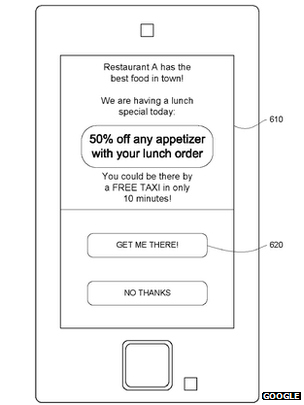Google patents ad tech linking restaurant to taxi ride
- Published

Google's graphic shows what customers might see on their smartphones
Technology giant Google has patented a way of linking online ads to free or discounted taxi rides to the advertising restaurant, shop or entertainment venue.
The transport-linked ad service could encourage consumers to respond more often to location-based special offers, experts say.
Algorithms would work out the customer's location, the best route and form of transport, Google says.
Analysts have welcomed the idea.
Gregory Roekens, chief technology officer at advertising company AMV BBDO, told the “óĻó“«Ć½: "This is trying to turn advertising into a utility and remove barriers for consumers. It's a really interesting idea."
Location-based
Advertisers will mine huge databases recording people's habits, likes and preferences so that ads can be highly targeted.
Combining this information with location data gleaned from wi-fi, cellular and GPS tracking will enable businesses to tailor their ads and special offers according to where people are, the time of day and their schedules.
The addition of free or cheap travel to the location will be the icing on the cake, Google hopes.
In August, Google's venture capital arm invested $258m (Ā£156m) in Uber, the San Francisco-based car hire network.
Mr Roekens believes Google is envisaging customers making use of such services when responding to mobile ads in future.
And given the company's major investment in autonomous vehicle technology, the prospect of customers being ferried automatically to nearby business venues after responding to location-based ads on their smartphones does not seem too fanciful.
But this was still "several years away", said Mr Roekens.
In future, customers could be driven to restaurants, bars, shops and venues by driverless cars
"Travel takes a huge amount of people's time," he said. "So if people can use this time more productively and interactively while in the vehicle, there's another opportunity for advertisers."
Transport sweetener
In the same way that advertisers bid against each other for the rights to Google keywords online, the company sees them competing on transport costs too.
The real-time system would help advertisers work out the costs of offering the transport sweetener versus the potential profit margins, Google said.
"Getting a potential customer to a business location in order to conduct a sale may be one of the most difficult tasks for a business or advertiser," Google says in its US patent for the "transportation-aware physical advertising conversions" system.
Alex Kozloff, head of mobile at the Internet Advertising Bureau, told the “óĻó“«Ć½: "I think this sounds like a really interesting idea, but its success all depends on its execution and the consumer benefit."
She thought that consumers who abused the system - continually taking up the offer of a free ride without making a follow-up purchase - would soon be barred from receiving special offers.
- Published20 January 2014
- Published13 January 2014